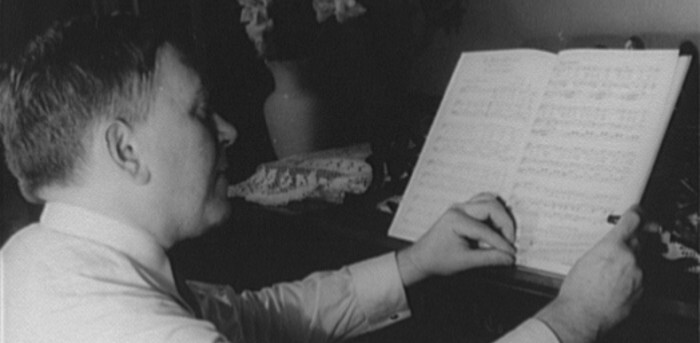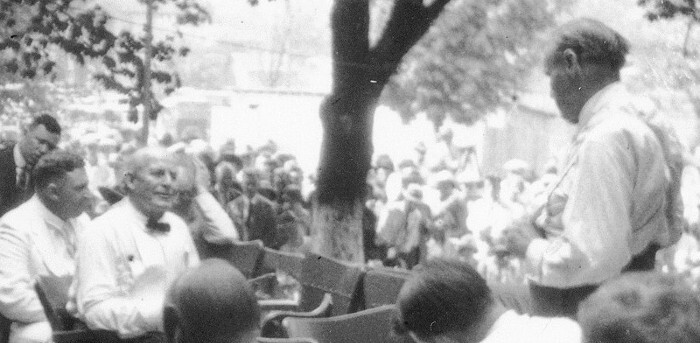The Scopes Monkey Trial: An Actual Circus, Real Monkeys

Ask most people what the Scopes Monkey Trial was and they’ll probably say something like, “It had something to do with evolution? And mouthwash, maybe?” A lot of them probably even think it’s the reason teachers are allowed to discuss evolution in schools, but the reality is that the trial of John T. Scopes was a carefully calculated move by the ACLU that, nevertheless, didn’t go the way anyone wanted it to.
It All Started With the Butler Act

The whole reason Scopes was on trial was Tennessee’s Butler Act, a law proposed by Tennessee House of Representatives member John Washington Butler to ban the teaching of evolution in the state in 1925. Butler later admitted, “I didn’t know anything about evolution when I introduced it, I’d read in the papers that boys and girls were coming home from school and telling their mothers and fathers that the Bible was all nonsense,” and Governor Austin Peay only signed the bill into law because he didn’t think it would actually be enforced. It was taxpayer money well spent all around.
Teachers Were Required to Break the Law

Peay had reason to believe the law was little more than a wink and nudge to Tennessee fundamentalists. The state-approved high school biology textbook, George William Hunter’s A Civic Biology, contained lessons on evolution, forcing teachers to either break the law or write assignments like, “Chapters 13-14, except paragraphs five, eight, and 17. Seriously, if you read those paragraphs, your genitals will explode.”
The Dayton Conspiracy
The ACLU immediately announced that they’d throw their weight behind any Tennessee teacher willing to get themselves arrested for breaking the law, so a businessman from Dayton, Tennessee got together with the rest of the town leaders to propose sending one of their teachers to jail as a publicity stunt for the town. Everyone was like, “Hell yeah, fuck the police,” and they decided to approach 24-year-old teacher John T. Scopes. Yes, that guy in the next picture is only 24.
Scopes Didn’t Even Teach Biology

Scopes wasn’t some passionate biology teacher. He actually taught math, physics, and chemistry. He’d only substituted in the class for two weeks and later said he couldn’t remember if he even covered evolution. In fact, he wasn’t allowed to take the stand at his own trial “for fear that he would reveal his ignorance on the subject he was indicted for teaching.”
A Surprise Cameo By HG Wells

(Library of the London School of Economics and Political Science/Wikimedia Commons)
The Dayton leaders went all in on doing whatever was necessary to hype up the case. Their ringleader even wrote a letter to British sci-fi author H.G. Wells to ask him to represent Scopes, which not only was not thrown out immediately by Wells’s secretary but confused the author enough to write back, politely explaining that he was as much an expert on American law as New Zealand cheese.
In the Blue Corner: Clarence Darrow

The lead defense attorney ended up being Clarence Darrow, who is pretty much the origin of the modern stereotype of the folksy country lawyer. He was most famous at the time for keeping Leopold and Loeb off death row the year before, so he wasn’t exactly beloved by the public at the time and initially turned down the offer before he "realized there was no limit to the mischief that might be accomplished unless the country was aroused to the evil at hand." See? That’s how he talked.
In the Red Corner: William Jennings Bryan

The prosecution was led by, well, technically the prosecutor, but in reality it was led by William Jennings Bryan, whose speech “Is the Bible True?” actually inspired Butler to write his Act. He was a former congressman, secretary of state, and three-time presidential nominee, but more importantly, he was the king of evangelical America in the early ‘20s. He’d actually spoken at Scopes’s high school graduation six years earlier.
Students Were Coached to Rat Him Out
With everything in place, the next step was to actually get Scopes arrested. Darrow and Scopes asked students to testify that he’d given them illegal thoughts and even coached them on exactly what to say, though the three students who ended up being questioned by the grand jury showed a “sketchy understanding” of evolution -- again, probably because Scopes never taught it -- leaving the jury with the impression that Scopes was not only a subversive teacher but a shitty one.
Scopes Was Never Detained
Everything about the Scopes trial was for show. He was technically arrested on May 25, 1925, but he was immediately released on $500 bail, put up by the owner of the Baltimore Sun, which was less a favor and more an investment in all those headlines that were about to sell him a lot of papers.
“Monkey Trial” was a Satirical Nickname

In fact, it was a Baltimore Sun reporter, H.L. Mencken, who named it the “Monkey Trial.” Mencken was known for his biting political commentary, having also coined the term “Bible Belt,” and he made it exceedingly clear whose side he was on, sarcastically referring to the defendant as “the infidel Scopes” and the people of Dayton as “hillbilly” “morons.” He was even chased down by a lynch mob for these comments, which didn’t exactly disprove his point. He was the one who suggested the project to Darrow and even partially funded the defense because the institution of journalism hadn’t quite gotten around to defining their ethics yet.
Media Circus

Mencken called Dayton “Monkeytown,” and he wasn’t being entirely metaphorical. Opportunists capitalized on the media attention by selling hot dogs, lemonade, and Bibles near the courthouse and exhibiting monkeys in people clothes and a supposed “missing link” (actually a very short, unfortunately featured but fully human man) for when people got bored. A famous monkey actor even showed up to perform on the courthouse lawn -- you know, where the trial was taking place after the judge ruled the courthouse too hot and crowded. “Circus” started to seem like a way too appropriate descriptor.
Darrow Planned His Interrogation of Bryan

The most famous moments of the trial was when Darrow, his whole strategy having been toppled by the judge disallowing expert testimony from scientists on the grounds that it had no bearing on whether Scopes broke the law, switched tacks and called Bryan to the stand as a “Bible expert,” proceeding to humiliate him as hard as if he’d rap-battled the questions. It appeared to be a spontaneous decision, but Darrow had carefully planned his interrogation the night before. It was his “Eminem writing rhymes on the bus” moment.
Conviction and Overturn
In the end, Darrow -- accepting there was no chance he was going to get to challenge the law in that courtroom -- asked the jury to find Scopes guilty. (This incidentally forced Bryan to throw his own arduously prepared closing remarks, and he died of a stroke five days after one of the worst days of his professional life.) The jury took nine minutes to do so, fining Scopes $100 -- the lowest possible sentence for his crime -- which was what ended up getting his conviction overturned in the Tennessee Supreme Court. The judge made it very clear that Scopes was getting off on a technicality because it should have been the judge who imposed the fine, not the jury, and he wasn’t ruling the Butler Act unconstitutional.
The Butler Act Was Brought Down By the Soviet Union
The Butler Act was initially upheld because it didn’t favor any particular religion, and that contention wasn’t really reconsidered until the Soviets started edging up on our space stuff. As a result, the U.S. government began diverting a lot more funds and attention to education, especially science, and understanding the theory of evolution suddenly didn’t seem so bad. Bans on teaching it were slowly repealed, including the Butler Act in 1967.
The Scopes Trial Festival

The trial didn’t quite give Dayton the population boost they were hoping for, and the time monkeys danced around their courthouse lawn remains the only really notable thing that’s happened there. They do get some tourist dollars from it, so there are plaques around town showing where people discussed things and they hold an annual Scopes Trial Festival, where actors reenact the proceedings in the old courthouse. It’s like Civil War reenactments, but with better clothes and slightly fewer guns.
Top image: Smithsonian Institution/Wikimedia Commons